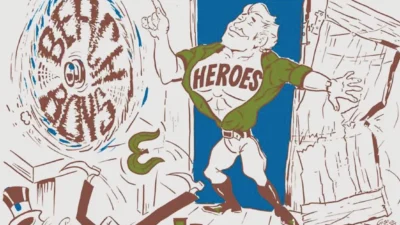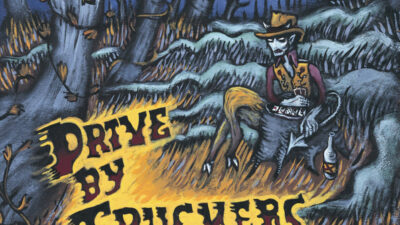Themes of disaffection were—and still are—at the heart of entire genres of music. Emo presents it through impassioned cries shrouded in distorted guitars; meanwhile, grunge conveys it via anthemic choruses and a marked rebellion against the status quo. STARLITE WALKER stands singular in the annals of such music. It blends a musical sensibility built on optimism with writing from one of our greatest modern poets in David Berman. We join him as he wanders the American landscape with immense pain in his tender heart and increasingly absurd ways to drown it. As this classic record turns 30, it’s time to reflect on what made it a cornerstone of rock and how it signified the arrival of one of the greatest musical projects ever.
While recorded at Easley Recording in Memphis, Tennessee, the bulk of David Berman’s writing for this record took place during an excursion in the woods of Oxford, Mississippi. It is hard to imagine that some of the lyrics invoking a feeling of ennui in this world were not a product of this environment. This was Silver Jews’ first full-length studio album. While their EPs were known in underground rock circles, STARLITE WALKER really took off due to the involvement of Pavement members Stephen Malkmus, Bob Nastanovich, and Steve West, as the group was well on its way to stardom.
While nothing can compare to “Random Rules” when it comes to Silver Jews album openers, “Introduction II” makes a strong case. It exemplifies the stranger at a party who strikes up a warm conversation because they can detect your discomfort, and before you know it, you are three cheap beers deep and discussing your insecurities with someone you’ll probably never see again. This is the ethos of Silver Jews at large: inviting the lonely and depressed youth to be lonely and depressed together.
STARLITE WALKER represents the constant switching between boundless hope and utter confusion that is the transition into adulthood. Berman and Malkmus almost unwittingly take on these roles on this record. The former understands we are yet to truly reckon with all that is unknown in our world, while Malkmus embodies an impish energy that is actually a defense mechanism against this reality. This feeling is perhaps best captured in “Advice to the Graduate”. Endlessly reassuring, it had a profound impact on me as I neared my own college graduation, as I’m sure it has for thousands before me. This ballad of hope is a tonal departure from a lot of Berman’s later discography, highlighting that this song is indubitably a result of his and Malkmus’ youthfulness during collaboration.
Nastanovich, the drummer for much of Silver Jews’ early works and all of Pavement’s, recounts as much on the liner notes of a reissue of the album. He said that the band was “peaking physically” during this recording. At this early stage, the Pavement members laid all their trust in Berman’s trusty hardbound notebook. His uncanny talent as a wordsmith has never wavered throughout his career, no matter the circumstances surrounding his personal life.
“Trains Across the Sea” is not only a definite Hall of Fame Silver Jews song, but one of the best rock songs ever made. “In 27 years / I’ve drunk 50,000 beers / And they just wash against me / Like the sea into a pier” is a prototypical Bermanism and one of the most renowned ones at that. The entire song is an ode to our collective failure to recognize the absurdity of our lives. Through Carltons and Cervezas, we have become numb to our aloofness on Earth and its idiosyncrasies. Rueful yet calming, this song brings forth the core ideas behind STARLITE WALKER through some of Berman’s finest songwriting ever.
This is perhaps the Silver Jews album with the strongest Malkmus influence, since the band was getting a lot more attention from him. Over the next few years Malkmus, Nastanovich, and the indie rock world at large viewed Silver Jews as a Pavement side project, which Berman occasionally leaned into for sales purposes (and a way to escape touring) but mostly despised. There is quite a marked difference between the two’s discographies without each other, which makes the existence of this album all the more enchanting. It is a moment where the duo is truly on the same page creatively.
Malkmus only worked on two more future Silver Jews projects (AMERICAN WATER and TANGLEWOOD NUMBERS). The difference between the two is much more pronounced on those records than STARLITE WALKER. Berman consistently performs like a mythical creature who has come unstuck in time, with an uncanny ability to relay the human experience with a deadpan delivery. Malkmus is the freewheeling indie rocker providing some flair to Berman’s passages, which is indicative of Pavement’s more indie-pop sensibilities.
Silver Jews records are cherished for their poetic wizardry rather than any wild musical swings. This album features one of their most “experimental” songs in “The Moon is Number 18”. It is a weird instrumental that does live up to its title—the moon is number 18 in a tarot deck, representing strangeness and mystery. Although enjoyable, it sounds like something that would be found on Lou Reed’s cutting room floor. It feels like Malkmus convinced Berman to let him get weird with it on just one song—a theory supported by the fact that such wild instrumentals don’t appear on future Silver Jews records not featuring him.
Berman said in a 2002 interview with Comes with a Smile that he views instrumentals as palette cleansers, but his proclivity for storytelling means that he sees them as stories too. “Transylvania Blues,” from 2001’s BRIGHT FLIGHT, is a wonderful, dreamlike instrumental that subconsciously details the chance meeting of his parents and his subsequent conception. The Pavement contingent clearly stopped putting as much stock in the lyrical mastery department after STARLITE WALKER, which was a big reason Berman went with Peyton Pinkerton and Matt Hunter as his collaborators for 1996’s THE NATURAL BRIDGE. Berman was always complimentary of Malkmus’ guitar skills from this point, but less gracious when talking about his creative command of the English language. Berman and Malkmus famously reunited for AMERICAN WATER, with “The Night Society” being one of the latter’s finest instrumental pieces.
I’m a sucker for tongue-in-cheek references to other songs, which makes “New Orleans” a standout. This song is littered with non-sequiturs, but beyond the tales of greedy Spanish gentlemen lies a poignant reckoning with the inevitability of death. This is the best the duo has complemented each other vocally, with Malkmus having his crowning moment as the chants of “Trapped inside the song / Where the nights are so long” fades into “There are traps inside us all / And the knife is so tall.”
The rest of the album feels like Berman experimenting to find his sonic footing, especially in the strange, electro-folk joint “The Country Diary of a Subway Conductor.” “Living Waters” is something that would feel at home on Pavement’s CROOKED RAIN, CROOKED RAIN, a glib look at the uncertainty within one’s place in the world. Overall, STARLITE WALKER marks the emergence of one of the most prolific songwriters to ever do it in Berman, while showcasing the versatility of a bona fide indie rockstar in Malkmus.
Early adulthood is reckoning with the cloudy existence ahead of us, with a slow realization that the juvenile vices and chaos were ways to cope with all that we could never hope to understand. STARLITE WALKER begins with you being asked to take a seat at a communal table of restlessness and go on a journey of reckoning with it in humorous ways. We are all kids finding our place in the world, dreaming of trains across the sea.
















Comments